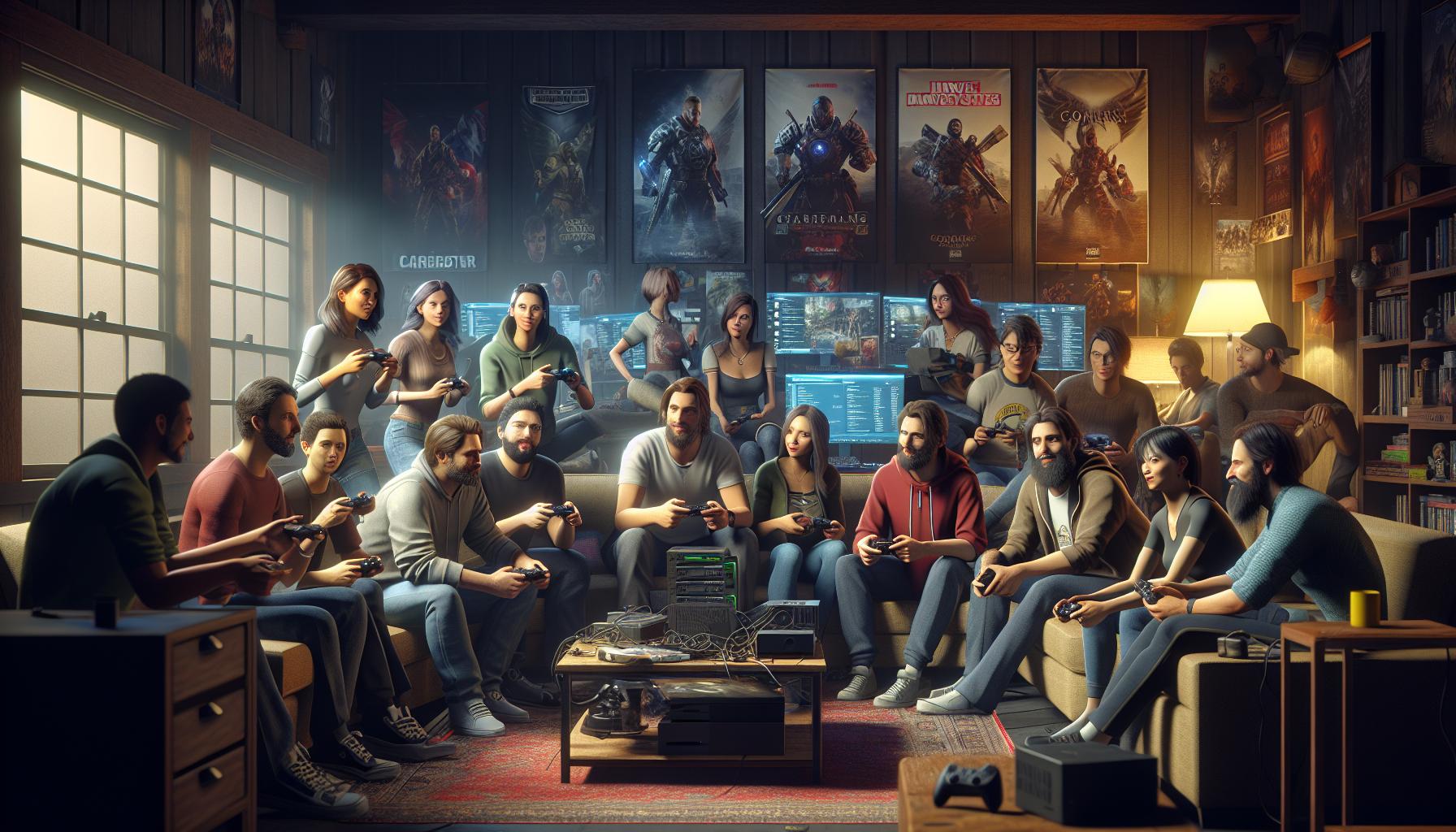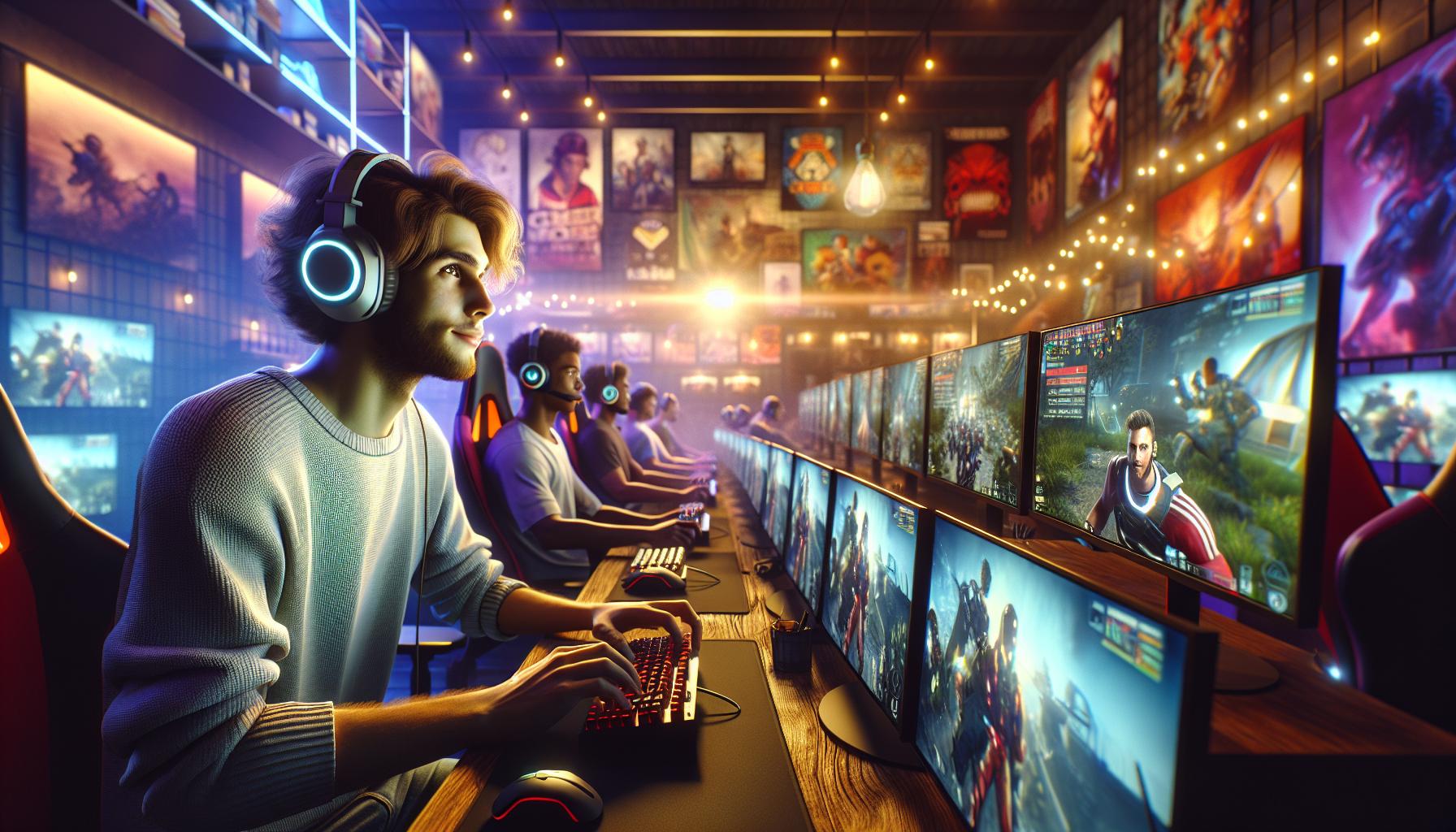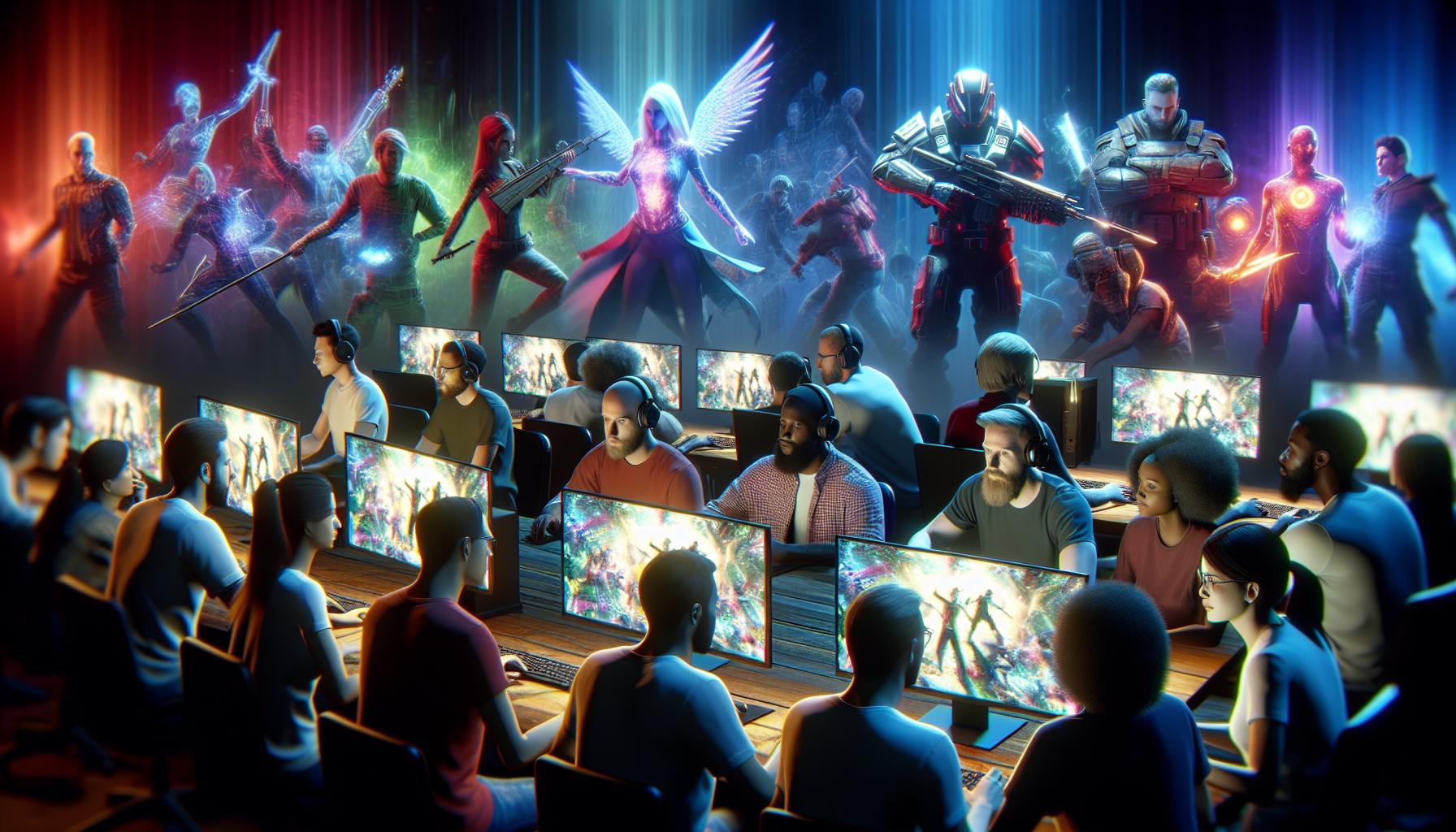Online gaming has evolved from a niche hobby into a global cultural phenomenon that connects millions of players across virtual worlds. From casual mobile games to competitive esports tournaments players have created vibrant communities that transcend geographical boundaries and traditional social norms.
Today’s gaming culture isn’t just about pressing buttons and beating high scores – it’s a dynamic ecosystem of streamers content creators and passionate fans who share experiences through platforms like Twitch and Discord. The rise of online gaming has sparked new forms of digital entertainment social interaction and even career opportunities that weren’t imaginable a decade ago.
Online Gaming Culture
Online gaming communities transformed from basic text-based interactions to complex social networks connecting millions of players worldwide. The evolution spans multiple technological generations creating increasingly sophisticated ways for gamers to interact collaborate share experiences.
From Chat Rooms to Virtual Worlds
Early online gaming communities emerged in 1990s IRC chat rooms where players coordinated basic gameplay sessions through text commands. MUDs (Multi-User Dungeons) expanded these interactions by creating persistent virtual environments where players explored text-based worlds together. Gaming communities experienced significant growth with the introduction of graphical MMORPGs like EverQuest in 1999 followed by World of Warcraft in 2004 which attracted over 12 million active subscribers. Modern virtual worlds feature immersive 3D environments social hubs customizable avatars integrated voice chat systems real-time events.
The Rise of Multiplayer Gaming Platforms
Steam launched in 2003 revolutionized digital game distribution by creating a centralized platform for multiplayer gaming social features. PlayStation Network Xbox Live expanded console gaming communities through dedicated online services reaching 100+ million active users. Discord emerged in 2015 combining gaming-focused communication features with community management tools serving 300+ million registered users. Cross-platform services like Epic Games enable players across different devices to connect compete together breaking traditional hardware barriers. Modern gaming platforms integrate streaming services tournament systems achievement tracking digital marketplaces creating comprehensive social ecosystems.
Social Dynamics in Gaming Spaces
Online gaming spaces create unique social environments where players develop complex interpersonal relationships through shared experiences digital interactions. These virtual communities foster distinctive patterns of communication collaboration which reshape traditional social norms.
Virtual Friendships and Relationships
Gaming platforms enable meaningful connections between players across geographical boundaries. Studies from the International Journal of Gaming Research indicate 67% of online gamers form lasting friendships through gaming communities. Players bond through shared achievements raid completions guild participation voice chat sessions. Discord servers host an average of 150 active members who engage in daily conversations beyond gameplay topics. Gaming relationships often transition to real-world connections with 45% of players meeting their online friends in person. Popular MMORPGs like Final Fantasy XIV feature dedicated social spaces including virtual housing nightclubs wedding ceremonies where players celebrate milestones together.
| Activity Type | Average Players | Communication Rate | Success Rate |
|---|---|---|---|
| Raid Groups | 25 | 90% | 65% |
| PvP Teams | 5 | 95% | 55% |
| Guild Events | 50 | 85% | 75% |
Gaming Language and Communication
Online gaming has developed its own unique linguistic ecosystem that combines technical jargon specialized terminology slang expressions. This distinct communication style shapes player interactions supports community building across digital gaming spaces.
Terminology and Slang
Gaming vocabulary incorporates specialized terms like “buff” (power increase), “nerf” (power decrease) “meta” (most effective strategy). Common abbreviations include “AFK” (away from keyboard), “GG” (good game) “DPS” (damage per second) which streamline in-game communication. Multiplayer games feature genre-specific terminology such as “ganking” (ambush attacks) in MOBAs “kiting” (attacking while moving) in MMORPGs “camping” (staying in one spot) in FPS games. Players adopt regional expressions like “int” (intentionally failing) in North American servers “rush B” (aggressive strategy) in European communities creating distinct gaming dialects.
Streaming Culture and Content Creation
Twitch streamers use unique phrases like “poggers” (excitement) “monkaS” (anxiety) through custom emotes that spread across gaming communities. Content creators develop catchphrases signature expressions that become part of gaming vernacular such as “let’s go” or “big brain play.” Popular streaming channels generate 350,000+ concurrent viewers during major events creating new linguistic trends through chat interactions. Gaming YouTubers influence communication patterns through edited content reaction videos reaching 25 million+ subscribers on leading channels.
| Platform | Active Streamers | Peak Concurrent Viewers | Most Used Expressions |
|---|---|---|---|
| Twitch | 8.5 million | 6.5 million | poggers, kappa, monkaS |
| YouTube Gaming | 40 million | 2.5 million | like & subscribe, lets go |
| Facebook Gaming | 1.5 million | 1.2 million | gg, wp, ez |
Representation and Identity
Online gaming platforms create unique spaces for players to explore personal identity through digital personas. These virtual environments enable unprecedented freedom in self-expression while fostering diverse communities.
Avatars and Self-Expression
Avatars serve as digital representations that allow players to craft their ideal online personas. Players customize characters through detailed appearance options including hairstyles outfits accessories skin tones body types in games like Black Desert Online The Sims 4. Recent studies show 65% of gamers create avatars that reflect aspects of their real-world identity while 35% experiment with different characteristics. Major gaming platforms offer extensive customization systems with games like Final Fantasy XIV providing over 400 unique appearance combinations. The rise of virtual cosmetic purchases reached $40 billion in 2022 demonstrating the value players place on avatar personalization.
Diversity in Gaming Communities
Gaming demographics reflect increasing diversity across age gender ethnicity socioeconomic backgrounds. Industry data reveals 45% of gamers identify as female with the average player age at 34 years old. Games like Overwatch League of Legends feature character rosters representing multiple ethnicities cultures abilities. Major gaming companies including Xbox PlayStation implement accessibility features reaching 46 million players with disabilities. Online communities form around shared interests rather than traditional social boundaries with 72% of players reporting interactions with people from different cultural backgrounds. Initiatives like AbleGamers Black Girl Gamers advocate for representation inclusion in gaming spaces.
The Impact of Esports
Esports has transformed competitive gaming into a global entertainment phenomenon worth $1.8 billion in 2023. Professional gaming competitions attract millions of viewers across streaming platforms with prize pools reaching up to $40 million for major tournaments.
Professional Gaming Culture
Professional gaming culture centers on intense training regimens spanning 8-12 hours daily. Elite esports athletes work with coaches, analysts, nutritionists, and mental health specialists to optimize performance. Teams operate from dedicated training facilities equipped with high-end gaming setups, practice rooms, and recovery areas. The average salary for professional players in major leagues ranges from $50,000 to $500,000 annually, plus sponsorship deals and streaming revenue. Top organizations like Team SoloMid, Cloud9, and T1 maintain rosters across multiple game titles, creating structured career paths for aspiring professionals.
Tournament Communities
Major esports events create unique spectator experiences through both online and in-person gatherings. The League of Legends World Championship draws 100 million peak concurrent viewers across streaming platforms. Local viewing parties unite fans in bars, theaters, and dedicated esports arenas worldwide. Online communities organize fantasy leagues, prediction contests, and discussion forums around tournament matches. Tournament organizers like ESL, PGL, and BLAST host regular circuits with dedicated fan engagement programs. Regional qualifiers and amateur tournaments connect grassroots communities to professional competition paths, fostering player development at all skill levels.
Gaming Ethics and Etiquette
Online gaming ethics establish standards for player behavior fundamental to maintaining healthy digital communities. These guidelines create a framework for respectful interaction ensuring fair competition across gaming platforms.
Fair Play and Sportsmanship
Fair play forms the cornerstone of competitive gaming environments through established practices that maintain game integrity. Players demonstrate sportsmanship by acknowledging skilled opponents with “gg” (good game) messages after matches. Top-tier games implement anti-cheat systems, with Valorant’s Vanguard detecting 1.1 million cheaters in 2022. Professional tournaments enforce strict rules against exploits software modifications with penalties ranging from disqualification to lifetime bans. Gaming platforms like Steam ban 80,000 accounts daily for violating fair play policies. Competitive integrity extends to casual play where players report suspicious behavior through in-game systems maintaining community standards.
Moderating Online Behavior
Effective moderation systems protect gaming communities from toxic behavior through automated detection tools player reporting mechanisms. Games implement filtering systems that screen 98% of harmful content before it reaches players. Major platforms employ dedicated moderation teams processing 250,000 reports daily. League of Legends’ Honor System rewards positive behavior increasing pleasant interactions by 40%. Xbox Live’s reputation system tracks player conduct affecting matchmaking queue priorities. Discord servers utilize automated moderation bots scanning 180 billion messages monthly ensuring safe communication channels.
Future Trends in Gaming Culture
Online gaming culture continues to evolve with technological advancements and shifting social dynamics. The integration of emerging technologies shapes new ways for players to interact and connect in digital spaces.
Virtual Reality Social Spaces
Virtual reality platforms transform social gaming interactions through immersive 3D environments. Meta’s Horizon Worlds attracts 300,000 monthly active users who participate in virtual concerts, games, and social gatherings. VRChat hosts 40,000 concurrent users exploring user-created worlds and engaging in real-time social activities. Social VR games like Population: One combine competitive gameplay with interactive social spaces, where players communicate through natural gestures and spatial audio. Leading VR platforms report that users spend an average of 2.5 hours daily in virtual social spaces, participating in activities ranging from virtual movie screenings to collaborative art creation.
Cross-Platform Communities
Cross-platform gaming breaks down traditional barriers between gaming ecosystems. Games like Fortnite connect 350 million registered players across PC, console, and mobile devices through unified accounts and shared progression systems. Discord integrates with multiple gaming platforms, serving 150 million monthly active users who communicate regardless of their gaming device. Modern games implement cross-save functionality, enabling players to maintain their progress across different platforms. The rise of cloud gaming services like Xbox Cloud Gaming and PlayStation Now enables seamless gaming experiences across devices, with 6.5 million active cloud gaming subscribers participating in cross-platform communities.




